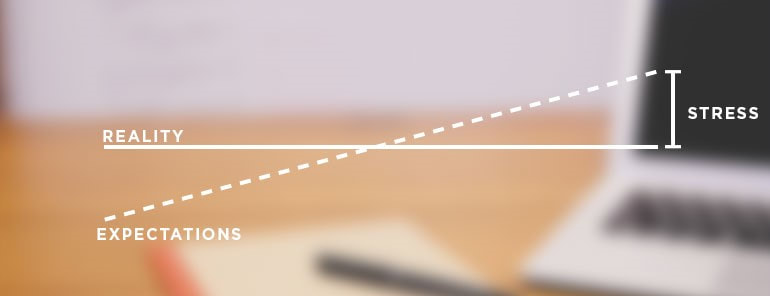|
What are you hoping for? Are you looking forward to a relaxed summer, vacation time, some changes in your schedule? Visits with family or friends? What are your expectations? Expectations tend to vary with each situation or circumstance. Do your expectations tend to be too high so they result in disappointments, stress, even depression when they aren’t met? Are they so low that you avoid or dread situations? Do the expectations create anxiety? (Anxiety is the fear of danger that is not immediately present; a fear of what might happen.) Are your expectations based on reality, experience, evidence or rather what you think should be, or want it to be, or fear it might be? The closer we bring the expectations line to the reality line, the more positive or less stressful our experience. The middle way is finding the place between expectations and reality. How does this work?
There is a situation (something happens or is planned) we have thoughts (interpret the situation) we develop feelings (the result of our thoughts, interpretations) we create expectations (our thoughts and feelings lead to our expectations) we engage in behavior (we act or do not act as a result of feelings generated by our expectations) we develop more feelings because of expectations (excited, glad, cautious, dread, anxious). Ok, simple! Well perhaps not – when the above results in good outcomes and we are pleased, we have found the middle way. Our expectations were closely in line with reality. When we feel anxious, fearful, severely disappointed, there is too large a gap between our expectations and reality. When our thoughts interpret situations in ways that cause us to feel anxious, depressed, unable to make decisions, or even lead us to expect “happily, this time it will be different,” we can look at them, examine and challenge them. Make a list of at least 5 different interpretations – the best possible outcome, the worst possible outcome and three in between. Ask how another would view the situation. This gives us a broader perspective on the situation. Our feelings change as our thoughts change. We may not become glad that the in-laws are coming to spend 2 weeks, but we can lose the dread. With various interpretations, we can see a number of solutions, ways to adjust expectations so the visit will be tolerable. With a more positive attitude, there may even be moments we enjoy because they were part of our best possible outcome, but not an expectation. The same process works and is needed when we expect, for instance a vacation, to be fabulous. Maybe it will be. Have vacations been great in the past? Who’s going, where are you going, for how long? What has your experience been in these situations? Are you expecting them to be the same? Why or why not? Are there any reasons to adjust your expectations so they more closely fit the reality of this vacation, rather than expect it to be just like the last one? What is your current reality, experience and what is the evidence for whatever your expectations are? Hopefully you will find something in this article to help you close some expectation gaps and have a wonderful summer! Remember, I work all year-round and will be here if you would like to make an appointment. Call, text or email me. Peace and Blessings, Dr. Jeanne Jeanne Robertson, Ph.D., LMFT, LPC Director, Center of Counseling and Education Contact Me Here
0 Comments
|
Archives
May 2024
Categories
All
|



 RSS Feed
RSS Feed
